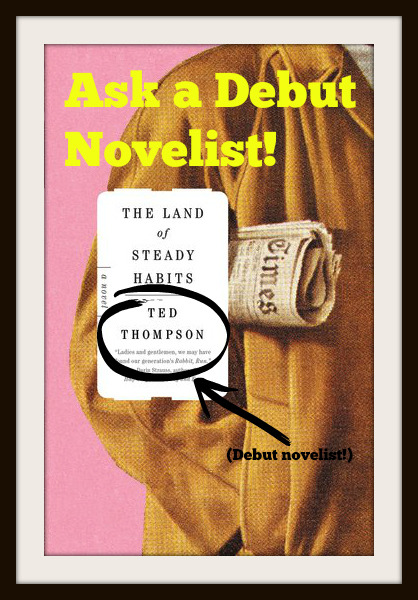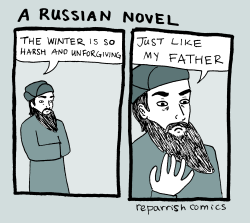
Ask a Debut Novelist - Question 4
In which thompsonted, author of The Land of Steady Habits, answers your questions about writing, publishing, and making good work. Have a question? Ask away.
Anonymous asked: Is there a good reason to seek to be published through Little, Brown and Company rather than self-publishing as an ebook?
This is a question I initially skipped because it seemed a little too practical, and I am by no means a publishing expert, or anything close to it. But then I found myself talking out my answer in the shower, and again at night before I drifted off to sleep, and I guess that’s an indication that there’s a lot more to this question than I initially thought.
So here are my initial, practical responses, the ones I would probably cite at a dinner party if we’d just met, Anonymous, and it seemed like maybe you were making chitchat since you’ve heard a lot about how digital technologies are disrupting traditional publishing and I maybe get the sense that the subtext of your question is that it’s a little old fashioned or backward-looking to be doing business with a company that still primarily traffics in paper and glue (a scenario that, for me these days, happens about every other month):
1. Money
Yes, there are best sellers that are self-published on Kindle, where the author ends up making enormous amounts of money on royalties because there are so few middle men involved, and every time I hear one of these stories I’m enamored with them, amazed, and filled with a kind of wild optimism about writers and readers and the narrowing gap between them, and the ability for words to find their proper homes in other people’s lives, despite things like the retail supply chain and its gatekeepers in tall glass buildings.But just because there are lottery winners doesn’t mean playing lotto is my retirement plan. The fact is a traditional publisher will pay you an advance—they’ll put their money up as a gamble and a gesture of their belief in the book—but more importantly they’ll cover all the considerable expenses involved in getting the book to readers. As I’ve mentioned before I had no idea how much work it was to get a book into stores (both physical and digital). It takes an enormous amount of person-to-person communication for this to happen, which requires relationships and trust and a reputation for not leading people astray, and all sorts of other intangible things that take time to forge. Also: money. It is possible to do this on your own, through social media, or by building a community of readers with a series, but I wasn’t writing a series, and working on a single book sucked up pretty much all of my time. So given the option, I’d still rather spend the time I have writing another book and let a huge, experienced company take care of a lot of the rest.
2. Real, professional readers
You can hire a structural editor and a line editor and a copyeditor. (I happen to do all of those things freelance, and enjoy them immensely, and give those projects everything I have.) But it’s not the same as having other people with a vested stake in your book. In fact, it seems to me having someone else whose fate is also tied to it is the only way to be sure you’ll be called out and challenged on the things you need to be. Editors both purchase your book (thereby laying their own reputations on the line) and also work with you to make it better, which they have a huge personal interest in doing. “Make it better” in my experience comes down to running your manuscript through their own minutely calibrated bullshit detectors. This also applies to agents, who edit as well, often extensively, and if they’re good at what they do won’t let you send anything out that’s not ready, no matter how brilliant you might think it is. One thing I’ve come to realize is that the series of (sometimes endless) gates you have to pass through on the way to publication make your book better. Like so much better. And in that way it’s actually a lot more of a team sport than any tortured writer mythology might have us believe.3. But, really, money
There’s just no replacement for not being broke. And an advance allows you, on a very practical level, a chance to get started on the next thing. It buys you time.But say I got the sense, at this dinner party, somewhere around the main course, that you’d decided to self-publish a few books of your own, books you were proud of but felt were maybe underestimated by the traditional publishing establishment and particularly the authors it supports. And say I liked you, which I probably would since in my little fantasy here you’re taking such an interest in me and we’re really getting along and genuinely laughing at the other person’s jokes and like some of the same books—in that case I would probably add:
4. I’m not sure I have the gumption to be my own book’s salesman, publicist and marketer
From my limited experience, publishing is about 10% making a book available and 90% talking about it. If it were just a matter of uploading a file onto Amazon and calling it a day, this would be different, but I know enough to know it’s a whole lot more than that, requiring time and skills, not least of which is a healthy dose of entrepreneurial salesmanship. If there’s anything in this world that seems to run counter to the persistent low hum of my natural self doubt, it would be having to also constantly pitch people, to convince strangers one at a time that they should spend their hard-earned money on my writing. Nothing makes me quite as uncomfortable as being pitched (“Excuse me sir, do you have three minutes for the environment?”), and the idea of doing that to other people about a book I wrote myself makes me want to just evaporate into a thin mist.5. I am naturally suspicious of self-promoters and salesmen
This is especially true when it comes to creative people, and I know it’s probably not the best attribute in me, and that it comes from both a place of uptight protestant manners—I can hear in the back of my head the word “unclassy” come bubbling up with all its problematic implications—and also one of snobbishness. Salesmanship is somehow an indication of a lack of integrity, of crass motivations peeking through a curtain that, for a real artist, should remain firmly drawn. Of course we all engage in it (ahem), and even those who refuse are eventually creating a kind of persona (“reclusive” “camera shy” or if you’re really lucky “enigmatic”), but for me the separation between writer and seller is already nicely built into the traditional model of author and publisher, so I guess you could say it’s convenient. Having someone else vouch for me is probably more important to me than I’d always like to admit.But, okay, say we were getting toward dessert, and had gone through all the red and the white and a half-bottle of rose someone found in the fridge, and we already had headaches brewing and knew tomorrow was a lost cause, and say our host broke out a dusty old bottle of port she’d been given by someone who knew about such things, a good one, though at this point neither of us would be able to tell the difference, and we were swirling that dense liquid in those little midget port glasses and realized we were the last two left at the party, that the candles had all burned down to goblins of wax and that the host was off in the kitchen scraping the plates that we really should have been scraping were we better guests—here are the things I would probably say then, in that setting, the things I would probably regret the following morning, when I woke up with that headache and wondered what the hell I had said after that second glass of port (and, you could argue, therefore the real reason):
6. If I’m totally honest, the one thing I write for is some sense of acceptance
I know how slippery that statement is, and how uncool, and that I may lose any shred of real artist cred I might have had, but if I strip away all of the layers of motivation that get me up and to my desk every morning, what’s left is some version of this. I think it’s important to note the difference between changing my writing to try and please some imaginary club (a trap if there ever was one, and one I’ve also fallen into many times), and writing what is truest for me, what is often uncommunicated in the daily chatter of life and yet is felt so deeply—trying to put that into words—and wanting to feel a sense of acceptance coming back at me, a sense that the work of communicating that subterranean life is worthy, and therefore, by extension, that I am worthy too. The moments of feeling this, acceptance for not only talent or craft but the substance of my unspoken feelings—whatever they are, dreams and desires and fears—are the real payments I’ve always been chasing. Of course acceptance is probably an unhealthy drug to get hooked on, because the who of it will always continue to change, the clubs whose entry you’re yearning for will continue to get smaller and more exclusive, and there will never be a moment of arrival. (Having a book published by Little, Brown should be that moment, and several years ago to me it would’ve been, but now I see it as just the beginning, the summit of one peak that’s granted me entry into a park of towering others.) If there’s one thing I admire so much about those who choose to self publish it’s this, this sense of sovereignty from the approval of others, which of course can translate into a fierceness of expression, though often it seems that the measure of acceptance is just transferred to sales, to the terms of the free market, which can be a blunt tool for measuring anything. I can beat myself up about this motivation, choose to see it as an indication of weakness, of a warped or malnourished self-esteem, but I also know that the yearning for acceptance is a kind of acknowledgment of the reader, a sign of respect for other people and maybe even humility before them. I can’t imagine anyone writing anything in language they hope will communicate not wanting acceptance. In a way it’s a beautiful thing, the reason so many of us continue to take what’s internal and make it external, the reason to dig deep and share.*
Previously on Ask a Debut Novelist:
- On Writing and Revision: “Throw away the scale. There is no scale, there is only your story.”
- On the Book Business: “Selling a book won’t change your life—except it kind of will.”
- On Compliments: “And maybe every piece of writing is an act of trust.”
Have a question for Ted? Drop it in our Ask Box.
Notes
mojitomehshh reblogged this from littlebrown
minecraftidea liked this
honeyigotkrunkwiththekids liked this
manjulamartin reblogged this from italicsmine
dajciespac liked this
 polaberry liked this
polaberry liked this unwritten-heaven reblogged this from littlebrown
ionceknewaunionmaid liked this
vkevans reblogged this from littlebrown
pineapple04elppaenip liked this
milagrobooks liked this
milagrobooks reblogged this from littlebrown
 el-avocado liked this
el-avocado liked this redyellowandblue-blog liked this
wearefreeassociation reblogged this from books
missivesfromtroy reblogged this from littlebrown
butsocold liked this
inkdaily-blog reblogged this from books
obeekris liked this
balthazarrr reblogged this from emmastraub
thereadingweirdo liked this
bloody-hades reblogged this from books
lifeofchudd reblogged this from books
aggiezivaljevic reblogged this from emmastraub
slaskow liked this
lloydy-boy69 liked this
cidtheobscure liked this
pamelab reblogged this from emmastraub and added:
Well written. Self publishing requires all the hats to be worn all the time.
pamelab liked this
 marymalik58 liked this
marymalik58 liked this yokg27 reblogged this from books
elementlz liked this
elementlz reblogged this from bookoisseur
rosebud019 liked this
 berezina liked this
berezina liked this daughteroftearsandpages reblogged this from books
daughteroftearsandpages liked this
gebeorshippen liked this
bloody-hades liked this
 wevegotthebeets liked this
wevegotthebeets liked this  velarissunsets liked this
velarissunsets liked this littlebrown posted this
- Show more notes

 My first novel, The Land of Steady Habits is out now from Little, Brown. It's about Connecticut and commuters, but it's also about love and betrayal and work and ritual and an elderly box turtle named Relic and a mysterious drug called "Peruvian Salt."
My first novel, The Land of Steady Habits is out now from Little, Brown. It's about Connecticut and commuters, but it's also about love and betrayal and work and ritual and an elderly box turtle named Relic and a mysterious drug called "Peruvian Salt." 






